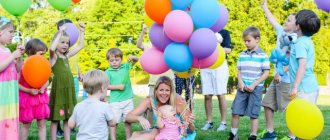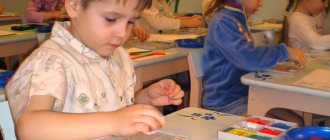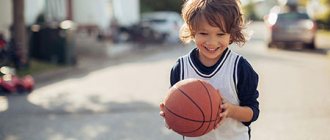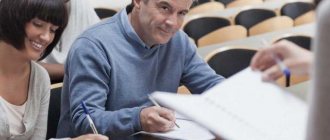Topic one. The health of our children. The role of hygiene
Photo: Hand photo created by ArthurHidden - www.freepik.com
It would be a good idea to invite a medical professional to a parent-teacher meeting. The event can be organized for both parents and children. Children spend at least 5 hours at an educational institution, so specialist recommendations on how to take care of personal hygiene, clean clothes and shoes are extremely important.
Sample event plan:
- Explain to children general facts about the skin, because this sense organ heals the human body, helps it cleanse itself and protects it. In addition, the skin is an indicator of health; it is sensitive to any, even the slightest, changes in the body.
- Touch on skin problems: allergies, infectious diseases. Tell schoolchildren that they need to closely monitor her condition.
- What else can cause skin problems. Complete the previous point: along with allergic rashes in the form of blisters, itching and redness, there are reactions to stress. When the baby is excited, afraid or, conversely, very irritated, the face may turn pale, become covered with red spots, and the body and hands become sticky. You should be vigilant and, if necessary, immediately seek advice from a doctor or cosmetologist.
- Cloth. It must comply with hygiene standards, the age of the child and the proportions of his body, and be clean and tidy.
- Shoes. Choose boots or shoes that fit; the load when walking should be distributed over the entire foot. Don’t ignore the fact that trying on someone else’s shoes, like items of clothing, is unhygienic. If a student has flat feet or has a fungal disease, recommend that parents see a doctor.
Preparatory group. Senior preschool age. Children 6-7 years old
Master class by a speech therapist for parents of children in the school preparatory group with TNR. Master class by a speech therapist teacher for parents of children in the school preparatory group “Game Library. Want to know everything. Prevention of dysgraphia"
.
— Dear parents , I invite you to an unusual master class, where we will play.
The games that I will show you are included in... Parent meeting in the senior group of the kindergarten “What a 5-6 year old child should know and be able to do” MUNICIPAL PRESCHOOL EDUCATIONAL INSTITUTION “CHILD DEVELOPMENT CENTER – KINDERGARTEN No. 52 “ROMASHKA”
ISTRA MUNICIPAL DISTRICT OF MOSCOW REGION
Golden Cockerel kindergarten “What a 5-6 year old child should know and be able to do”
...
Parent meeting in the middle group on the topic “Age characteristics of 4-5 years”
Provide the child with the opportunity to play together with other children
, realizing that such a game not only develops his imagination and imaginative thinking, but is also absolutely necessary for healthy emotional development. Offer the child for play not only toys that are complete in form, but also unshaped objects that do not have a clear function: pebbles, sticks, blocks, etc.
Understand that the child is already capable of doing what he likes for a long time and enthusiastically, and it can be very difficult for him to interrupt the game
, so it’s worth warning him in advance about the need to finish it.
Be open to your child's questions
, be interested in his opinion, turning his thirst for knowledge into the ability to find answers to questions that interest him. It is useful to discuss with your child any events and phenomena that interest him, and in his language to formulate the results of your joint reasoning and conclusions.
Blitz survey of parents on actively manifested characteristics in children of our group
What should a 4-5 year old child know and be able to do?
Speech development:
Correctly pronounce all the sounds of your native language;
Use nouns in speech that denote professions;
Use nouns with a general meaning: vegetables, fruits, berries, animals;
Agree words in gender, number, case;
Use sentences with homogeneous members;
Retell short literary texts, compose a story based on a plot picture, toy, objects;
Be able to answer questions based on the content of what you read;
Read short poems and nursery rhymes by heart;
Reproduce the content of works of art using the teacher’s questions.
Cognitive development:
Count within 5 (quantitative counting), answer the question “how much in total”;
Compare 2 groups of objects using counting;
Compare 5 objects of different lengths and heights, arranging them in ascending order by length and height;
Recognize and name a triangle, distinguish it from a circle and a square;
Distinguish and name parts of the day;
Determine the direction of movement from yourself (right, left, forward, backward, up, down);
Know your right and left hand;
Know and name the main parts of a building material (cube, block, plates);
Learn to analyze a building sample: identify the main parts and distinguish them by size and shape;
Be able to design from paper: bend a rectangular sheet of paper in half, matching the sides and corners;
Be able to identify the characteristics of objects (color, shape, size);
Determine the material from which the thing is made (wood, metal, paper, fabric);
Know furniture, clothing, dishes, some fruits, transport (cars, trains, planes, ships) in the immediate environment;
Summary of the parent meeting in the preparatory group “Soon to school”
Summary of the parent meeting in the preparatory group
"Soon to school"
Goal: to create conditions for the inclusion of parents of future first-graders in the process of preparing their child for school.
Tasks:
- Introduce parents to the criteria for children's readiness for school.
- Inform parents about the problems of first-graders (during the period of adaptation to school) and their causes.
- Offer practical advice and recommendations for preparing your child for school.
Participants: parents of future first-graders, teachers,
Form of implementation: parent school.
Equipment and materials: multimedia installation, “Back to school” presentation
Teacher's report.
Hello, dear parents, today we will talk to you about preparing our children for school. (slides 1-2)
This is the end of our children’s last year in kindergarten. The stage of development called preschool childhood ends. Soon the school will open its doors to the children, and a new period in their lives will begin. They will become first-graders, and you, dear mothers and fathers, will “sit down” at their desks with them.
(slide 3)
Being ready for school does not mean being able to count, write and read. Being ready for school means being ready to learn it all.
The beginning of school is a new stage in the life of a child (and parents too), which, of course, requires a certain level of readiness for this qualitatively new stage in life and a completely new type of activity - educational. Often, readiness to learn only means a certain level of knowledge, skills and abilities of a child, which of course is also important. The most important thing when moving to a qualitatively new level is psychological readiness for learning activities. And, first of all, the formation of desire is learned (motivational readiness). But that's not all. There is a huge gap between “I want to go to school” and “I need to learn to work.” Without realizing this “need,” a child will not be able to study well, even if before school he can read, write, count well, and so on. When preparing a child for school, it is necessary to teach him to listen, see, observe, remember, and process the information received.
Now we will focus on the criteria for children’s readiness for school, i.e. Let's consider what should be characteristic of a child in order for him to be ready for school.
(slide 4)
While we are revealing the content of each component of school readiness, please try to “try them on” for your child and decide what you need to pay attention to today in order for your child to be successful in school.
Readiness criteria:
1. physical
Topic four. Congratulations to the birthday people
Photo: Birthday photo created by pressfoto – www.freepik.com
Celebrating a birthday together helps strengthen friendships in the classroom and gives good positive emotions to children, parents and teachers.
When the guys congratulate each other, parents will be able to personally observe the communication within the team, perhaps identify conflicts or difficulties in order to resolve them in a timely manner.
Organize festive gatherings with balloons, cakes and greetings twice a year. Then children born in summer and autumn will receive their portion of attention and gifts at the end of November. And honor the guys whose birthdays fall in the winter-spring period at the end of May.
To organize the celebration, it is logical to involve parents whose children will be included in the upcoming group of birthday people. They can prepare fun competitions, entertaining games, and set the table with treats. Here it is important to take into account the character and hobbies of children: some love activities, while others, on the contrary, love calm, logical quests.
It is appropriate to expand the program of the meeting with an educational part, where the class teacher will tell:
- about a competent attitude to problems at school;
- about how to help your child improve self-esteem;
- How to encourage a student and increase his interest in learning.
You can end the celebration with a mini-disco: turn on the children’s favorite music and dance together.
Topic five. Safe life
Photo: Summer photo created by wayhomestudio – www.freepik.com
The parent meeting will include information that every citizen is obliged to live in accordance with the norms of current legislation. If possible, it is better to invite a juvenile affairs inspector who will tell you:
- about hooliganism and crimes;
- about what other actions may entail administrative or criminal liability for persons over 14 years of age (theft, extortion, violent acts, including sexual ones, damage to property, etc.);
- about the dire consequences of conflicts and practical advice for their peaceful resolution.
Don’t forget about the basic strategies for behavior in conflict situations: competition, adaptation, avoidance, compromise and cooperation. Write and print out notes explaining the classification of methods of behavior in conflict.



